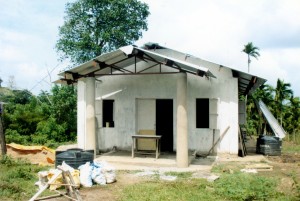Building Chapels in India
 Catholic charity Aid to the Church in Need (ACN) has come to the aid of islanders in the Bay of Bengal who could not afford to finish building chapels in rural areas with no priests.
Catholic charity Aid to the Church in Need (ACN) has come to the aid of islanders in the Bay of Bengal who could not afford to finish building chapels in rural areas with no priests.
Bishop Alex Dias explained how parishioners in his Diocese of Port Blair, which covers the Andaman and Nicobar islands, have been erecting small chapels, which double as schools and parish meeting places.
In response to an urgent request from the diocese, Catholic charity, Aid to the Church in Need, has provided $20,000 to provide roofs for 15 chapels.
Bishop Dias said, “When ACN came to our aid it was a great blessing.”
He added, “Having a decent chapel helps the people to come together. [The Diocese of Port Blair] is a rainy and wet place. If you don’t have a decent chapel, it is difficult for people to gather; having a chapel is definitely a blessing.”
The bishop described how typically these chapels have been small thatched huts made of bamboo, but nine months of torrential rain every year meant the huts needed regular, extensive repairs.
Not only has repairing rain damage taken a lot of time, but the Supreme Court of India’s ban on cutting naturally grown trees in rain forests, which cover roughly 86 percent of Andaman and Nicobar Islands, has caused problems.
The bishop explained how even those who take bamboo or leaves for thatching roofs could be liable to arrest, “making it hard for our people to maintain the chapels.”
In response to the ban some of the faithful have erected semi-concrete churches. These are built in brick for the first 3-4 foot and the rest is finished in bamboo or wood.
These were erected at the congregations’ own expense, but they lacked funds to provide proper roofs, so the diocese made a commitment to supply roofing.
Bishop Dias said, “We are using aluminum sheets – as they are longer lasting.”
These chapels are essential as much of the Catholic community is spread out in rural and wooded areas and each of the diocese’s 14 parishes have 15-30 sub-stations, which in some places cater to more than 200 families.

